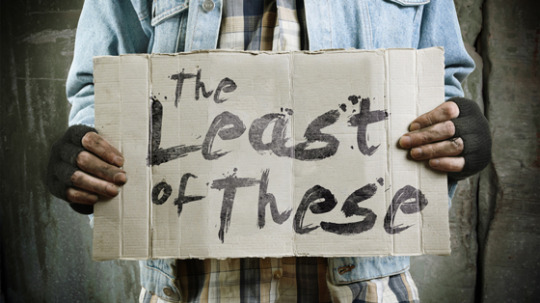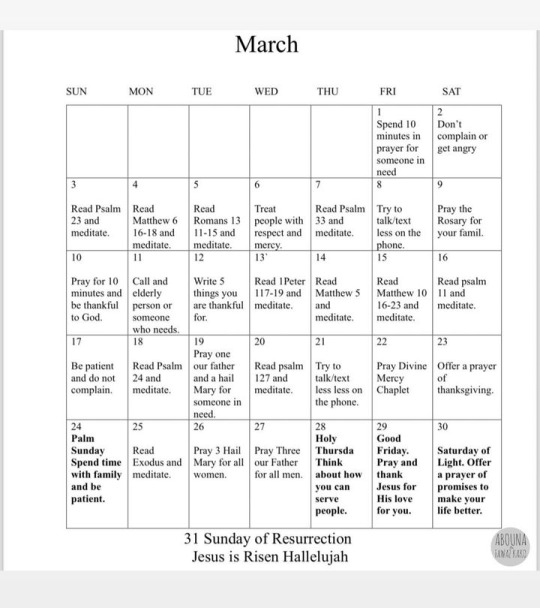Text
No one can describe in words the high value of prayer, for it transcends even the mystery of the angels
Saint John Chrysostom
111 notes
·
View notes
Text
Every human person possesses an infinite dignity, inalienably grounded in his or her very being, which prevails in and beyond every circumstance, state, or situation the person may ever encounter. This principle, which is fully recognizable even by reason alone, underlies the primacy of the human person and the protection of human rights. In the light of Revelation, the Church resolutely reiterates and confirms the ontological dignity of the human person, created in the image and likeness of God and redeemed in Jesus Christ. From this truth, the Church draws the reasons for her commitment to the weak and those less endowed with power, always insisting on “the primacy of the human person and the defense of his or her dignity beyond every circumstance.”
Dignitas Infinita, paragraph 1
20 notes
·
View notes
Text

Forgive us for failing to see Christ in the poor, the distressed, and the troublesome,
—and for our failure to reverence Your Son in their persons.
from the Morning Intercessory Prayers of the Monday of the Second Week of Lent.
Jésus-Christ s’habille en pauvre;
L’aumône va demander
Jésus-Christ s’habille en pauvre;
L’aumône va demander
"Monsieur qu’êtes sur la porte
Faites-moi la charité."
La Ballade de Jésus Christ
14 notes
·
View notes
Text
[B]oth service and vulnerability are necessary dimensions of the love of Christ. We must both serve and allow ourselves to be served.
Rev. Jude Winkler, O.F.M. Conv.
13 notes
·
View notes
Text
Jesus ate with sinners. He didn't support their lifestyles, but it didn't stop Him from loving them and helping them.
766 notes
·
View notes
Text

Happy Easter 🖤
Picture from the Bible app
17 notes
·
View notes
Text
“Do you want to honor Christ’s body? Then do not scorn him in his nakedness, nor honor him here in the church with silken garments while neglecting him outside where he is cold and naked. For he who said: ‘This is my body,’ and made it so by his words also said: ‘You saw me hungry and did not feed me, and inasmuch as you did not do it for one of these, the least of my brothers, you did not do it for me.’”
— St. John Chrysostom, From a homily on Matthew
253 notes
·
View notes
Text
Brothers and sisters, from the Cross, the “cathedra of God”, the Lord teaches us that true glory, that which never fades and makes us happy, is made up of giving and forgiveness. Giving and forgiveness are the essence of the glory of God. And for us, they are the way of life. Giving and forgiveness: very different criteria to what we see around us, and also within us, when we think of glory as something to receive rather than to give; something to possess instead of something to offer. No, worldly glory fades, and does not leave joy in the heart; it does not even lead to the good of all, but rather to division, discord, and envy.
And so, we can ask ourselves: what is the glory I desire for myself, for my life, that I dream of for my future? That of impressing others with my prowess, my abilities, or the things I possess? Or the path of giving and forgiveness, that of the Crucified Jesus, the way of those who never tire of loving, confident that this bears witness to God in the world and makes the beauty of life shine? What kind of glory do I want for myself? Indeed, let us remember that when we give and forgive, God’s glory shines in us. Right there: when we give and forgive.
Pope Francis
#catholicism#christianity#works of mercy#spiritual works of mercy#quote#pope francis#pope francis quote
18 notes
·
View notes
Text
(possibly) difficult question to ask yourself;
Do you offer your help to everyone regardless of their circumstances or who they are, or do you only help the people you think need or "deserve" it?
I am not trying to be judgemental. I just think it's important to get to the bottom of why we help people in order to make sure we're not being picky with our generosity
#catholicism#christianity#works of mercy#spiritual works of mercy#corporal works of mercy#generosity
21 notes
·
View notes
Text
So, let us ask ourselves: first of all, what is my prayer like? Is it a price to be paid, or is it a moment of trusting abandonment, without looking at the clock? And how are my relationships with others? Am I capable of giving without expecting anything in return? Can I take the first step to break down the walls of silence and the voids of distance? We must ask ourselves these questions.
Pope Francis, March 3rd 2024 Angelus
#catholicism#christianity#works of mercy#spiritual works of mercy#corporal works of mercy#quote#pope francis#pope francis quote
6 notes
·
View notes
Text
How To Support People
Sometimes, when someone is struggling, we default to giving or offering what support we would want in that specific situation. We don’t mean to, but it can cause harm to someone who we are trying to help.
So what can we do instead?
I would ask people: “How can I support you?” But it was often too open-ended. My loved ones didn’t know what they needed.
Mental, emotional, and physical are support types that can be used to give personalized offers for support! Sometimes, people need specific offers of support, usually a mix of types.
Mental support could be:
Facts
Wisdom
Constructive feedback
Solutions
Advice
Solutions
Resources
Mentoring
Guidance
Pros and cons
Advocacy
Reminders
Logical steps
Planning
Some examples can look like:
- “I complied resources for you”
- “Let’s make a support plan together”
- “When I was in a similar situation, I did…”
Emotional support could be:
Validation
Venting
Commiseration
Solidarity
Affirmation
Listening
Check-ins
Distraction
Space
Comfort
Praise
Motivation
AITA?
Some examples can look like:
- “Tell me what’s bothering you”
- “I think it’s reasonable that you feel this way”
- “You got this!”
- “Do you need space?”
Physical support could be:
Housework/chores
Physical touch
Mutual aid funds
Body doubling
Acts of service
Gifts
Flowers
Food
Cards
Transportation
Some examples can look like:
- “I finished your to-do list for you”
- “I made you your favorite dinner”
- “Let’s do this together”
- “Can I make a fundraiser for this?”
We all have various needs and capacities, but I hope we can all find creative solutions to help support each other. Keep caring.
382 notes
·
View notes
Text

Lent 2023
"GIVE SOMETHING, HOWEVER SMALL, TO THE ONE IN NEED. FOR IT IS NOT SMALL TO ONE WHO HAS NOTHING. NEITHER IS IT SMALL TO GOD, IF WE HAVE GIVEN WHAT WE COULD."
ST. GREGORY NAZIANZEN
Prints, plaques & holy cards available for purchase here: (website)
58 notes
·
View notes
Text


For Lent I'm going to be inactive except on the weekends, as well as following this schedule made by a priest I follow on Instagram, Abouna Fawaz. If you'd like to join me, please feel free to save these screenshots! I hope you all have a blessed Lent full of prayer, growth, and mercy 💜

5 notes
·
View notes
Text
Today, on the memorial of the Blessed Virgin of Lourdes, we celebrate World Day of the Sick, which this year draws attention to the importance of relationships in sickness. The first thing we need when we are ill is the proximity of loved ones, of healthcare professionals and, in our heart, God’s closeness. We are all required to be a neighbour to those who suffer, to visit the sick as Jesus teaches us in the Gospel. Therefore, today I wish to express my closeness, and that of the entire Church, to all those who are sick or frail. Let us not forget God’s style: proximity, compassion and tenderness.
Pope Francis, after the Angelus 2/11/2024
#catholicism#christianity#works of mercy#corporal works of mercy#visit the sick#quote#pope francis#pope francis quote#world day of the sick
3 notes
·
View notes
Text
Angelus, February 11th 2024
Dear brothers and sisters, buongiorno!
Today’s Gospel presents us with the healing of a leper (cf. Mk 1:40-45). To the sick man, who implores Him, Jesus answers: “I will; be clean!” (v. 41). He utters a very simple phrase, which He immediately puts into practice. Indeed, “immediately the leprosy left him, and he was made clean” (v. 42). This is Jesus’ style with those who suffer: few words, and concrete deeds.
Many times, in the Gospel, we see Him behave in this way towards those who suffer: deaf mutes (cf. Mk 7:31-37), paralytics (cf. Mk 2:1-12), and many others in need (cf. Mk 5). He always does this: He speaks little and His words are followed promptly by actions: He bows, takes by the hand, and heals. He does not waste time with discourses or interrogations, much less in pietism or sentimentalism. Rather, He shows the delicate modesty of one who listens attentively and acts with solicitude, preferably without being conspicuous.
It is a wonderful way to love, and how it would do us good to imagine it and assimilate it! Let us also think of when it we happen to encounter people who act like this: sober in words, but generous in action; reluctant to show off but ready to make themselves useful; effective in helping because they are willing to listen. Friends to whom one can say: “Do you want to listen to me? Do you want to help me?”, with the confidence of hearing them answer, almost with Jesus’ words: “Yes, I will, I am here for you, to help you!”. This concreteness is so much more important in a world such as our own, in which an evanescent virtuality of relationships seems to be gaining ground.
Let us listen instead to how the Word of God provokes us: “If a brother or sister is ill-clad and in lack of daily food, and one of you says to them, ‘Go in peace, be warmed and filled’, without giving them the things needed for the body, what does it profit?” (James 2:15-16). The Apostle James says this. Love needs tangibility, love needs presence, encounter, it needs to be given time and space: it cannot be reduced to beautiful words, to images on a screen, momentary selfies and hasty messages. They are useful tools that can help, but they are not enough for love; they cannot substitute real presence.
Let us ask ourselves today: do I know how to listen to people, am I ready to meet their requests? Or do I make excuses, procrastinate, hide behind abstract or useless words? In real terms, when was the last time I went to visit someone who was alone or sick – everyone can answer in their heart – or when was the last time I changed my plans to meet the needs of someone who asked me for help?
May Mary, solicitous in care, help us to be ready and tangible in love.
6 notes
·
View notes
Text
Remember to send a card to kids at St. Jude Hospitals!
17 notes
·
View notes
Text
It's so weird how many people just don't understand forgiveness, redemption, or penitence/penance, at all.
Like you explain that a person or character did something bad but then became penitent and was forgiven and/or redeemed of it, and people will say "OH SO THAT MAKES IT OKAY??" like.... that's not....... the point??????
1K notes
·
View notes